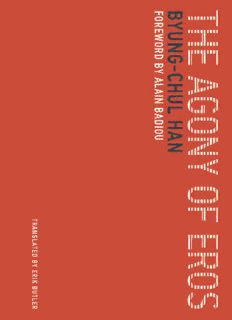
The Agony of Eros PDF
Preview The Agony of Eros
T H E A G O N Y O F E R O S UNTIMELY MEDITATIONS 1. THE AGONY OF EROS Byung-Chul Han 2. ON HITLER’S MEIN KAMPF: THE POETICS OF NATIONAL SOCIALISM Albrecht Koschorke 3. IN THE SWARM: DIGITAL PROSPECTS Byung-Chul Han 4. THE TERROR OF EVIDENCE Marcus Steinweg THE MIT PRESS FBT O CAMBRIDGE, MASSACHUSETTS RY LONDON, ENGLAND EWUH ON R E DG BY- ACA LH A INUG BL A DHO I OA U N N Y O F E R O T R S A N S L A T E D B Y E R IK B U T L E R © 2017 Massachusetts Institute of Technology Originally published as Agonie des Eros in the series Fröhliche Wissenschaft by Matthes & Seitz Berlin: © Matthes & Seitz Berlin Verlagsgesellschaft mbH, Berlin 2012. All rights reserved. All rights reserved. No part of this book may be reproduced in any form by any electronic or mechanical means (including photocopying, recording, or information storage and retrieval) without permission in writing from the publisher. This book was set in PF Din Text Pro by Toppan Best-set Premedia Limited. Printed and bound in the United States of America. Library of Congress Cataloging-in-Publication Data Names: Han, Byung-Chul, author. Title: The agony of eros / Byung-Chul Han ; foreword by Alain Badiou ; translated by Erik Butler. Other titles: Agonie des Eros. English Description: Cambridge, MA : MIT Press, 2017. | Series: Untimely meditations | Includes bibliographical references and index. Identifiers: LCCN 2016031913 | ISBN 9780262533379 (pbk. : alk. paper) Subjects: LCSH: Love. | Desire. | Burn out (Psychology) Classification: LCC BF575.L8 H334 2017 | DDC 128/.46--dc23 LC record available at https://lccn.loc.gov/2016031913 10 9 8 7 6 5 4 3 2 1 CONTENTS FOREWORD: THE REINVENTION OF LOVE, BY ALAIN BADIOU vii MELANCHOLIA 1 BEING ABLE NOT TO BE ABLE 9 BARE LIFE 17 PORN 29 FANTASY 35 THE POLITICS OF EROS 43 THE END OF THEORY 47 NOTES 55 Foreword: The Reinvention of Love In this book, Byung-Chul Han bears witness to how love—in the strong sense that a long historical tradition has granted it—is threatened. Perhaps it is already dead—at any rate, it is gravely ill. Hence the title, The Agony of Eros. But whose blows have struck true love so low? The perpetrators are contemporary individualism, the effort to determine the market value of everything, and the set of monetary interests that now govern all conduct. In truth, love refuses to accept all such norms of the contemporary world—the world of globalized capitalism—because it is not a simple pact of pleasant coexistence between two indi- viduals; rather it is the radical experience, perhaps to the outermost point, of the existence of the Other. To demonstrate as much, the author offers a kind of phenomenology of true love—including sexual love—and tracks down, in their many forms, the threats it faces. On the one hand, this involves describing what occurs in the abso- lute experience of alterity; on the other, it means indicting, on an array of different registers, all that draws us away from such experience—and even prevents us from seeing that it exists at all, or the consequences this circumstance brings. Implacably, Han argues that the minimum condition for true love is possessing sufficient courage to accept Foreword vii self-negation for the sake of discovering the Other. At the same time, he provides an intensive survey of all the traps set for, and attacks perpetrated on, the very possibility of eros in a world that, as it stands, cares only for agreement, agreeability, and narcissistic gratification. This work proves utterly absorbing precisely because of its unlikely combination of philosophical rigor (it concludes with a striking quotation from Deleuze and Guattari) and a wealth of far-ranging sources. The first chapter enlists Lars von Trier’s Melancholia, as well as Bruegel’s The Hunters in the Snow and Wagner’s Tristan und Isolde (both of which are featured in von Trier’s film), to show how the disastrous irruption of pure exterior- ity—the wholly Other—represents a catastrophe for the ordinary balance of the subject. By the same token, how- ever, apparent disaster offers the good fortune of escape and absence from oneself—and ultimately shows the way to redemption. After a severe critique of Foucault—who is faulted for valorizing ability, “power” (in opposition to the passivity of knowledge), and therefore performance—the second chap- ter features a measured appreciation of Levinas and Buber, who discerned that, as Han puts it, “Eros is a relationship to the Other situated beyond achievement, performance, and Can.” What escapes Foucault entirely, and Levinas merely touches on, is, in fact, a central argument of the book: “The negativity of Otherness—that is, the atopia of the Other, which eludes all ability—is constitutive of erotic experience.” This striking formulation represents, as it were, the matrix of the work as a whole: “Only by way of viii Foreword
Description: